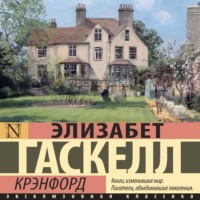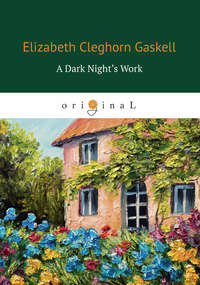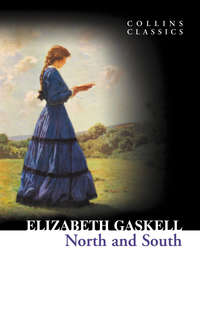
Полная версия
Mary Barton
‘Oh, how charming it will be! I’ll help you if you’re backward. Have you much to do?’
‘Yes, I only got the order yesterday at noon; and there’s three girls beside the mother; and what with trying on and matching the stuff (for there was not enough in the piece they chose first), I’m above a bit behindhand. I’ve the skirts all to make. I kept that work till candlelight; and the sleeves, to say nothing of little bits to the bodies; for the missis is very particular, and I could scarce keep from smiling while they were crying so, really taking on sadly I’m sure, to hear first one and then t’other clear up to notice the set of her gown. They weren’t to be misfits, I promise you, though they were in such trouble.’
‘Well, Margaret, you’re right welcome, as you know, and I’ll sit down and help you with pleasure, though I was tired enough of sewing to-night at Miss Simmonds’.’
By this time Mary had broken up the raking coal, and lighted her candle; and Margaret settled herself to her work on one side of the table, while her friend hurried over her tea at the other. The things were then lifted en masse to the dresser; and dusting her side of the table with the apron she always wore at home, Mary took up some breadths and began to run them together.
‘Who’s it all for, for if you told me I’ve forgotten?’
‘Why, for Mrs Ogden as keeps the greengrocer’s shop in Oxford Road. Her husband drank himself to death, and though she cried over him and his ways all the time he was alive, she’s fretted sadly for him now he’s dead.’
‘Has he left her much to go upon?’ asked Mary, examining the texture of the dress. ‘This is beautifully fine soft bombazine.’
‘No, I’m much afeard there’s but little, and there’s several young children, besides the three Miss Ogdens.’
‘I should have thought girls like them would ha’ made their own gowns,’ observed Mary.
‘So I dare say they do, many a one, but now they seem all so busy getting ready for the funeral; for it’s to be quite a grand affair, well-nigh twenty people to breakfast, as one of the little ones told me; the little thing seemed to like the fuss, and I do believe it comforted poor Mrs Ogden to make all the piece o’ work. Such a smell of ham boiling and fowls roasting while I waited in the kitchen; it seemed more like a wedding nor* a funeral. They said she’d spend a matter o’ sixty pound on th’ burial.’
‘I thought you said she was but badly off,’ said Mary.
‘Ay, I know she’s asked for credit at several places, saying her husband laid hands on every farthing he could get for drink. But th’ undertakers urge her on, you see, and tell her this thing’s usual, and that thing’s only a common mark of respect, and that everybody has t’other thing, till the poor woman has no will o’ her own. I dare say, too, her heart strikes her (it always does when a person’s gone) for many a word and many a slighting deed to him who’s stiff and cold; and she thinks to make up matters, as it were, by a grand funeral, though she and all her children, too, may have to pinch many a year to pay the expenses, if ever they pay them at all.’
‘This mourning, too, will cost a pretty penny,’ said Mary. ‘I often wonder why folks wear mourning; it’s not pretty or becoming; and it costs a deal of money just when people can spare it least; and if what the Bible tells us be true, we ought not to be sorry when a friend, who’s been good, goes to his rest; and as for a bad man, one’s glad enough to get shut† on him. I cannot see what good comes out o’ wearing mourning.’
‘I’ll tell you what I think the fancy was sent for (old Alice calls everything “sent for,” and I believe she’s right). It does do good, though not as much as it costs, that I do believe, in setting people (as is cast down by sorrow and feels themselves unable to settle to anything but crying) something to do. Why now I told you how they were grieving; for, perhaps, he was a kind husband and father, in his thoughtless way, when he wasn’t in liquor. But they cheered up wonderful while I was there, and I asked ’em for more directions than usual, that they might have something to talk over and fix about; and I left ’em my fashion-book (though it were two months old) just a purpose.’
‘I don’t think every one would grieve a that way. Old Alice wouldn’t.’
‘Old Alice is one in a thousand. I doubt, too, if she would fret much, however sorry she might be. She would say it were sent, and fall to trying to find out what good it were to do. Every sorrow in her mind is sent for good. Did I ever tell you, Mary, what she said one day when she found me taking on about something?’
‘No; do tell me. What were you fretting about, first place?’
‘I can’t tell you, just now; perhaps I may some time.’
‘When?’
‘Perhaps this very evening, if it rises in my heart; perhaps never. It’s a fear that sometimes I can’t abide to think about, and sometimes I don’t like to think on anything else. Well, I was fretting about this fear, and Alice comes in for something, and finds me crying. I would not tell her no more than I would you, Mary; so she says, “Well, dear, you must mind this, when you’re going to fret and be low about anything – An anxious mind is never a holy mind.” O Mary, I have so often checked my grumbling sin’* she said that.’
The weary sound of stitching was the only sound heard for a little while, till Mary inquired:
‘Do you expect to get paid for this mourning?’
‘Why, I do not much think I shall. I’ve thought it over once or twice, and I mean to bring myself to think I shan’t, and to like to do it as my bit towards comforting them. I don’t think they can pay, and yet they’re just the sort of folk to have their minds easier for wearing mourning. There’s only one thing I dislike making black for, it does so hurt the eyes.’
Margaret put down her work with a sigh, and shaded her eyes. Then she assumed a cheerful tone, and said:
‘You’ll not have to wait long, Mary, for my secret’s on the tip of my tongue. Mary, do you know I sometimes think I’m growing a little blind, and then what would become of grandfather and me? Oh, God help me, Lord help me!’
She fell into an agony of tears, while Mary knelt by her, striving to soothe and to comfort her; but, like an inexperienced person, striving rather to deny the correctness of Margaret’s fear, than helping her to meet and overcome the evil.
‘No,’ said Margaret, quietly fixing her tearful eyes on Mary; ‘I know I’m not mistaken. I have felt one going some time, long before I ever thought what it would lead to; and last autumn I went to a doctor; and he did not mince the matter, but said unless I sat in a darkened room, with my hands before me, my sight would not last me many years longer. But how could I do that, Mary? For one thing, grandfather would have known there was somewhat the matter; and, oh! it will grieve him sore whenever he’s told, so the later the better; and besides, Mary, we’ve sometimes little enough to go upon, and what I earn is a great help. For grandfather takes a day here, and a day there, for botanising or going after insects, and he’ll think little enough of four or five shillings for a specimen; dear grandfather! And I’m so loath to think he should be stinted of what gives him such pleasure. So I went to another doctor to try and get him to say something different, and he said, “Oh, it was only weakness,” and gived me a bottle of lotion; but I’ve used three bottles (and each of ’em cost two shillings), and my eye is so much worse, not hurting so much, but I can’t see a bit with it. There now, Mary,’ continued she, shutting one eye, ‘now you only look like a great black shadow, with the edges dancing and sparkling.’
‘And can you see pretty well with th’ other?’
‘Yes, pretty near as well as ever. Th’ only difference is, that if I sew a long time together, a bright spot like th’ sun comes right where I’m looking; all the rest is quite clear but just where I want to see. I’ve been to both doctors again, and now they’re both o’ the same story; and I suppose I’m going dark as fast as may be. Plain work pays so bad, and mourning has been so plentiful this winter, that I were tempted to take in any black work I could; and now I’m suffering from it.’
‘And yet, Margaret, you’re going on taking it in; that’s what you’d call foolish in another.’
‘It is, Mary! and yet what can I do? Folk mun live; and I think I should go blind any way, and I darn’t tell grandfather, else I would leave it off; but he will so fret.’
Margaret rocked herself backward and forward to still her emotion.
‘O Mary!’ she said, ‘I try to get his face off by heart, and I stare at him so when he’s not looking, and then shut my eyes to see if I can remember his dear face. There’s one thing, Mary, that serves a bit to comfort me. You’ll have heard of old Jacob Butterworth, the singing weaver? Well, I know’d him a bit, so I went to him, and said how I wished he’d teach me the right way o’ singing; and he says I’ve a rare fine voice, and I go once a week, and take a lesson fra’ him. He’s been a grand singer in his day. He led the choruses at the Festivals, and got thanked many a time by London folk; and one foreign singer, Madame Catalani, turned round and shook him by th’ hand before the Oud Church* full o’ people. He says I may gain ever so much money by singing; but I don’t know. Any rate, it’s sad work, being blind.’
She took up her sewing, saying her eyes were rested now, and for some time they sewed on in silence.
Suddenly there were steps heard in the little paved court; person after person ran past the curtained window.
‘Something’s up,’ said Mary. She went to the door, and stopping the first person she saw, inquired the cause of the commotion.
‘Eh, wench! donna ye see the fire-light? Carsons’ mill is blazing away like fun’; and away her informant ran.
‘Come, Margaret, on wi’ your bonnet, and let’s go to see Carsons’ mill; it’s afire, and they say a burning mill is such a grand sight. I never saw one.’
‘Well, I think it’s a fearful sight. Besides, I’ve all this work to do.’
But Mary coaxed in her sweet manner, and with her gentle caresses, promising to help with the gowns all night long, if necessary, nay, saying she should quite enjoy it.
The truth was, Margaret’s secret weighed heavily and painfully on her mind, and she felt her inability to comfort; besides, she wanted to change the current of Margaret’s thoughts; and in addition to these unselfish feelings came the desire she had honestly expressed, of seeing a factory on fire.
So in two minutes they were ready. At the threshold of the house they met John Barton, to whom they told their errand.
‘Carsons’ mill! Ay, there is a mill on fire somewhere, sure enough by the light, and it will be a rare blaze, for there’s not a drop o’ water to be got. And much Carsons will care, for they’re well insured, and the machines are a’ th’ oud-fashioned kind. See if they don’t think it a fine thing for themselves. They’ll not thank them as tries to put it out.’
He gave way for the impatient girls to pass. Guided by the ruddy light more than by any exact knowledge of the streets that led to the mill, they scampered along with bent heads, facing the terrible east wind as best they might.
Carsons’ mill ran lengthways from east to west. Along it went one of the oldest thoroughfares in Manchester. Indeed, all that part of the town was comparatively old; it was there that the first cotton mills were built, and the crowded alleys and back streets of the neighbourhood made a fire there particularly to be dreaded. The staircase of the mill ascended from the entrance at the western end, which faced into a wide, dingy-looking street, consisting principally of public-houses, pawnbrokers’ shops, rag and bone warehouses, and dirty provision shops. The other, the east end of the factory, fronted into a very narrow back street, not twenty feet wide, and miserably lighted and paved. Right against this end of the factory were the gable ends of the last house in the principal street – a house which from its size, its handsome stone facings, and the attempt at ornament in the front, had probably been once a gentleman’s house; but now the light which streamed from its enlarged front windows made clear the interior of the splendidly fitted up room, with its painted walls, its pillared recesses, its gilded and gorgeous fittings-up, its miserable squalid inmates. It was a gin palace.
Mary almost wished herself away, so fearful (as Margaret had said) was the sight when they had joined the crowd assembled to witness the fire. There was a murmur of many voices whenever the roaring of the flames ceased for an instant. It was easy to perceive the mass were deeply interested.
‘What do they say?’ asked Margaret of a neighbour in the crowd, as she caught a few words, clear and distinct from the general murmur.
‘There never is any one in the mill, surely!’ exclaimed Mary, as the sea of upward-turned faces moved with one accord to the eastern end, looking into Dunham Street, the narrow back lane already mentioned.
The western end of the mill, whither the raging flames were driven by the wind, was crowned and turreted with triumphant fire. It sent forth its infernal tongues from every window hole, licking the black walls with amorous fierceness; it was swayed or fell before the mighty gale, only to rise higher and yet higher, to ravage and roar yet more wildly. This part of the roof fell in with an astounding crash, while the crowd struggled more and more to press into Dunham Street, for what were magnificent terrible flames – what were falling timbers or tottering walls, in comparison with human life?
There, where the devouring flames had been repelled by the yet more powerful wind, but where yet black smoke gushed out from every aperture – there, at one of the windows on the fourth storey, or rather a doorway where a crane was fixed to hoist up goods, might occasionally be seen, when the thick gusts of smoke cleared partially away for an instant, the imploring figures of two men. They had remained after the rest of the workmen for some reason or other, and, owing to the wind having driven the fire in the opposite direction, had perceived no sight or sound of alarm, till long after (if anything could be called long in that throng of terrors which passed by in less than half-an-hour) the fire had consumed the old wooden staircase at the other end of the building. I am not sure whether it was not the first sound of the rushing crowd below that made them fully aware of their awful position.
‘Where are the engines?’ asked Margaret of her neighbour.
‘They’re coming, no doubt; but bless you, I think it’s bare ten minutes since we first found out th’ fire; it rages so wi’ this wind, and all so dry-like.’
‘Is no one gone for a ladder?’ gasped Mary, as the men were perceptibly, though not audibly, praying the great multitude below for help.
‘Ay, Wilson’s son and another man were off like a shot, wellnigh five minutes ago. But th’ masons, and slaters, and such like, have left their work, and locked up the yards.’
Wilson, then, was that man whose figure loomed out against the ever-increasing dull hot light behind, whenever the smoke was clear – was that George Wilson? Mary sickened with terror. She knew he worked for Carsons; but at first she had had no idea that any lives were in danger; and since she had become aware of this, the heated air, the roaring flames, the dizzy light, and the agitated and murmuring crowd, had bewildered her thoughts.
‘Oh! let us go home, Margaret; I cannot stay.’
‘We cannot go! See how we are wedged in by folks. Poor Mary! ye won’t hanker after a fire again. Hark! listen!’
For through the hushed crowd pressing round the angle of the mill, and filling up Dunham Street, might be heard the rattle of the engine, the heavy, quick tread of loaded horses.
‘Thank God!’ said Margaret’s neighbour, ‘the engine’s come.’
Then there was a pressure through the crowd, the front rows bearing back on those behind, till the girls were sick with the close ramming confinement. Then a relaxation, and a breathing freely once more.
‘’Twas young Wilson and a fireman wi’ a ladder,’ said Margaret’s neighbour, a tall man who could overlook the crowd.
‘Oh, tell us what you see?’ begged Mary.
‘They’ve getten it fixed against the gin-shop wall. One o’ the men i’ the factory has fell back; dazed wi’ the smoke, I’ll warrant. The floor’s not given way there. God!’ said he, bringing his eye lower down, ‘the ladder’s too short! It’s a’ over wi’ them, poor chaps. Th’ fire’s coming slow and sure to that end, and afore they’ve either getten water, or another ladder, they’ll be dead out and out. Lord have mercy on them!’
A sob, as if of excited women, was heard in the hush of the crowd. Another pressure like the former! Mary clung to Margaret’s arm with a pinching grasp, and longed to faint, and be insensible, to escape from the oppressing misery of her sensations. A minute or two.
‘They’ve taken th’ ladder into th’ Temple of Apollor. Can’t press back with it to the yard it came from.’
A mighty shout arose; a sound to wake the dead. Up on high, quivering in the air, was seen the end of the ladder, protruding out of a garret window, in the gable end of the gin palace, nearly opposite to the doorway where the men had been seen. Those in the crowd nearest to the factory, and consequently best able to see up to the garret window, said that several men were holding one end, and guiding by their weight its passage to the doorway. The garret window-frame had been taken out before the crowd below were aware of the attempt.
At length – for it seemed long, measured by beating hearts, though scarce two minutes had elapsed – the ladder was fixed, an aerial bridge at a dizzy height, across the narrow street.
Every eye was fixed in unwinking anxiety, and people’s very breathing seemed stilled in suspense. The men were nowhere to be seen, but the wind appeared, for the moment, higher than ever, and drove back the invading flames to the other end.
Mary and Margaret could see now: right above them danced the ladder in the wind. The crowd pressed back from under; firemen’s helmets appeared at the window, holding the ladder firm, when a man, with quick, steady tread, and unmoving head, passed from one side to the other. The multitude did not even whisper while he crossed the perilous bridge, which quivered under him; but when he was across, safe comparatively in the factory, a cheer arose for an instant, checked, however, almost immediately, by the uncertainty of the result, and the desire not in any way to shake the nerves of the brave fellow who had cast his life on such a die.
‘There he is again!’ sprung to the lips of many, as they saw him at the doorway, standing as if for an instant to breathe a mouthful of the fresher air, before he trusted himself to cross. On his shoulders he bore an insensible body.
‘It’s Jem Wilson and his father,’ whispered Margaret; but Mary knew it before.
The people were sick with anxious terror. He could no longer balance himself with his arms; everything must depend on nerve and eye. They saw the latter was fixed, by the position of the head, which never wavered; the ladder shook under the double weight; but still he never moved his head – he dared not look below. It seemed an age before the crossing was accomplished. At last the window was gained; the bearer relieved from his burden; both had disappeared.
Then the multitude might shout; and above the roaring flames, louder than the blowing of the mighty wind, arose that tremendous burst of applause at the success of the daring enterprise. Then a shrill cry was heard, asking:
‘Is the oud man alive, and likely to do?’
‘Ay,’ answered one of the firemen to the hushed crowd below. ‘He’s coming round finely, now he’s had a dash of cowd water.’
He drew back his head; and the eager inquiries, the shouts, the sea-like murmurs of the moving rolling mass began again to be heard – but only for an instant. In far less time than even that in which I have endeavoured briefly to describe the pause of events, the same bold hero stepped again upon the ladder, with evident purpose to rescue the man yet remaining in the burning mill.
He went across in the same quick steady manner as before, and the people below, made less acutely anxious by his previous success, were talking to each other, shouting out intelligence of the progress of the fire at the other end of the factory, telling of the endeavours of the firemen at that part to obtain water, while the closely packed body of men heaved and rolled from side to side. It was different from the former silent breathless hush. I do not know if it were from this cause, or from the recollection of peril past, or that he looked below, in the breathing moment before returning with the remaining person (a slight little man) slung across his shoulders, but Jem Wilson’s step was less steady, his tread more uncertain; he seemed to feel with his foot for the next round of the ladder, to waver, and finally to stop half-way. By this time the crowd was still enough; in the awful instant that intervened no one durst speak, even to encourage. Many turned sick with terror, and shut their eyes to avoid seeing the catastrophe they dreaded. It came. The brave man swayed from side to side, at first as slightly as if only balancing himself; but he was evidently losing nerve, and even sense; it was only wonderful how the animal instinct of self-preservation did not overcome every generous feeling, and impel him at once to drop the helpless, inanimate body he carried; perhaps the same instinct told him, that the sudden loss of so heavy a weight would of itself be a great and imminent danger.
‘Help me; she’s fainted,’ cried Margaret. But no one heeded. All eyes were directed upwards. At this point of time a rope, with a running noose, was dexterously thrown by one of the firemen, after the manner of a lasso, over the head and round the bodies of the two men. True, it was with rude and slight adjustment: but slight as it was, it served as a steadying guide; it encouraged the sinking heart, the dizzy head. Once more Jem stepped onwards. He was not hurried by any jerk or pull. Slowly and gradually the rope was hauled in, slowly and gradually did he make the four or five paces between him and safety. The window was gained, and all were saved. The multitude in the street absolutely danced with triumph, and huzzaed, and yelled till you would have fancied their very throats would crack; and then, with all the fickleness of interest characteristic of a large body of people, pressed and stumbled, and cursed and swore, in the hurry to get out of Dunham Street, and back to the immediate scene of the fire, the mighty diapason of whose roaring flames formed an awful accompaniment to the screams, and yells, and imprecations, of the struggling crowd.
As they pressed away, Margaret was left, pale and almost sinking under the weight of Mary’s body, which she had preserved in an upright position by keeping her arms tight round Mary’s waist, dreading, with reason, the trampling of unheeding feet.
Now, however, she gently let her down on the cold clean pavement; and the change of posture, and the difference in temperature, now that the people had withdrawn from their close neighbourhood, speedily restored her to consciousness.
Her first glance was bewildered and uncertain. She had forgotten where she was. Her cold, hard bed felt strange; the murky glare in the sky affrighted her. She shut her eyes to think, to recollect.
Her next look was upwards. The fearful bridge had been withdrawn; the window was unoccupied.
‘They are safe,’ said Margaret.
‘All? Are all safe, Margaret?’ asked Mary.
‘Ask yon fireman, and he’ll tell you more about it than I can. But I know they’re all safe.’
The fireman hastily corroborated Margaret’s words.
‘Why did you let Jem Wilson go twice?’ asked Margaret.
‘Let? – why, we could not hinder him. As soon as ever he’d heard his father speak (which he was na long a doing), Jem were off like a shot; only saying he knowed better nor us where to find t’other man. We’d all ha’ gone, if he had na been in such a hurry, for no one can say as Manchester firemen is ever backward when there’s danger.’









